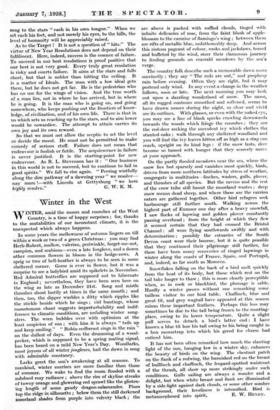Winter in the West
WINTER, amid the moors and coombes of the West Country, is a time of happy surprises ; for, thanks to the mutabilities of our inconstant climate, it is the unexpected which always happens. .
In some years the mellowness of autumn lingers on till within a week or two of a green Christmas : you may find Herb-Robert, mallow, valerian, periwinkle, forget-me-not, tampion, and scabious—even a late foxglove, and a dozen other common flowers in bloom in the hedge-rows. A sprig or two of bell-heather is always to be seen in some sheltered corner. Gorse is ever in flower, but it was a Surprise to see a ladybird amid its spikelets in November. 'Red Admiral butterflies are supposed not to hibernate in England ; nevertheless, they have been seen here on the wing as late as December 21st. Song and mistle thrushes shout lustily at times in the same month ; and then, too, the dipper warbles a ditty which ripples like the stickle beside which he sings ; cirl buntings, whose monotonous chant suggests imperturbability and indif- ference to climatic conditions, are unfailing winter song- sters. The wren bubbles over with optimism at the least suspicion of sun ; with him it is always " tails up and keep smiling." " Robin-redbreast sings in the rain on the dullest of days. Even the drumming of a wood- pecker, which is supposed to be a spring mating signal, has been heard on a mild New Year's Day. Woodlarks, most joyous of all winter jongleurs, hail the dawn in song with admirable constancy.
Larks greet the sun's awakening at all seasons. To mankind, winter sunrises are more familiar than those of summer. We wake to find the room flooded with a subdued rosy radiance ; above the rim of skyline streaks of tawny orange and glowering red sprawl like the glisten- ing length of some gaudy dragon-salamander. Pines top the ridge in silhouette ; below them the still darkened moorland shades from purple into velvety black ; the arc above is packed with ruffled clouds, tinged with infinite delicacies of rose, from the faint blush of apple- blossom to the carmine of flamingo's wing ; between them are rifts of metallic blue, unfathomably deep. And across this riotous pageant of colour; rooks and jackdaws, tossed and buffeted by the wind, steer their clamorous journey to feeding grounds on emerald meadows by the sea's verge.
The country folk describe such a memorable dawn more succinctly ; they say " The reds are out," and prophesy rain before evening. Often they are right, but it may portend only wind. In any event a change in the weather follows, soon or late. The next morning you may look out upon a dazzling wonderland of snow. The moor, all its rugged contours smoothed and softened, seeing to have drawn nearer during the night, so clear and vivid are its outlines. With glasses, or even with the naked eye, you may see a line of black specks crawling downwards towards the woods which fringe the coombes ; they are the red-deer seeking the succulent ivy which clothes the stunted oaks ; walk through any sheltered woodland and you will find the ivy leaves bitten off as high as a stag can reach, upright on its hind legs : if the snow lasts, deer become so tamed with hunger that they scarcely move at your approach.
On the partly flooded meadows near the sea, where the snow lies but sparsely and vanishes most quickly, birds, driven from more northern latitudes by stress of weather, congregate in multitudes—finches, waders, gulls, plover, and thrushes of all species. But the ravens and the rest of the crow tribe still haunt the moorland wastes ; deep Snow means dead sheep, and where these are the carrion eaters are gathered together. Other bird refugees seek harbourage still further south. Walking across the highest part of Exmoor one day after a heavy snowfall, I saw flocks of lapwing and golden plover constantly passing overhead ; from the height at which they flew it seemed certain that they had crossed the Bristol Channel : all were flying southwards swiftly and with determination ; possibly the estuaries of the South Devon coast were their bourne, but it is quite possible that they continued their pilgrimage still further, for there have been many recoveries of ringed lapwings in winter along the coasts of France, Spain, and Portugal, and, indeed, as far south as Morocco.
SnoWflakes falling on the back of a bird Melt quickly from the heat of its body, but those which rest on the tail take longer to thaw ; this is more clearly perceptible when, as in rook or blackbird, the plumage is sable: Hardly a winter passes without one remarking some tailless visitor to our bird table. Chaffinch, blue and great tit, and grey wagtail have appeared at this season minus these important feathers. Perhaps this loss may sometimes be due to the tail being frozen to the roosting- place, owing to its lower temperature. Quite a slight pull serves 'to detach a bird's latter end : I have known a blue tit lose his tail owing to his being caught in a box mousetrap into which his greed for 'cheese had enticed him.
It has not been often remarked how much the slanting light of the sun, hanging low in a winter sky, enhances the beauty of birds on the wing. The chestnut patch on the flank of a redwing, the burnished red on the breast of bullfinch and chaffinch, the leopard-spotted waistcoat of the thrush, all show up more strikingly under such conditions. Gulls sailing are always a wonder and a delight, but when white breast and flank are illuminated by a side-light against dark clouds, or some other sombre background, their loveliness is intensified. Bird is






































 Previous page
Previous page